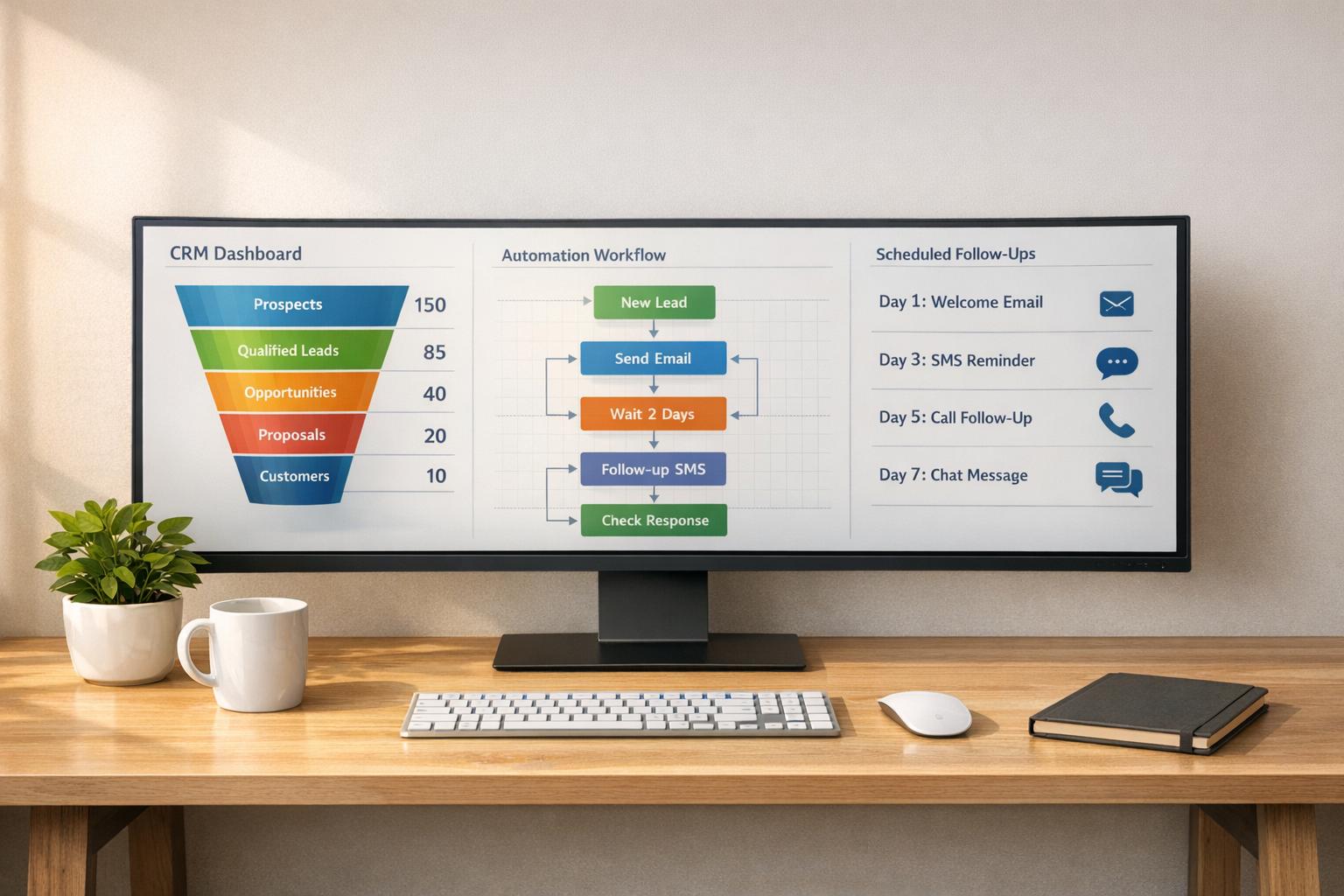Top GDPR Training Programs for Data Sharing Compliance

GDPR compliance is a must for any business handling EU citizens' data. Non-compliance can lead to fines up to €20 million or 4% of global revenue. For U.S. companies, this means adhering to strict rules for data sharing, even without a physical EU presence.
The best way to ensure compliance? Training. Programs tailored to GDPR help businesses reduce risks, improve data handling, and build trust with EU partners. Here’s a quick overview of top training options:
- Cloud Assess: Free courses for beginners and advanced professionals, focusing on GDPR basics and cross-border data sharing.
- Advisera: Affordable online training ($200–$400) with practical exercises and certifications.
- TechGDPR: Developer-focused training ($500–$1,000) on privacy-by-design and secure data sharing.
- Coursera: Beginner-friendly course ($49–$99) with flexible, self-paced learning.
- IAPP: Industry-recognized certifications (CIPP/E, CIPM) for privacy professionals ($1,000–$2,000+).
- PECB: Advanced certifications like Certified Data Protection Officer ($1,000–$2,500).
- LinkedIn Learning: Microsoft-specific GDPR tools training ($39.99/month).
- Reform: A no-code tool for GDPR-compliant data collection (starting at $15/month).
Each program offers unique benefits depending on your needs - whether you're training employees, IT teams, or compliance officers.
Maturing your GDPR compliance program: Employee awareness training
1. Cloud Assess: Introduction to GDPR Training Course
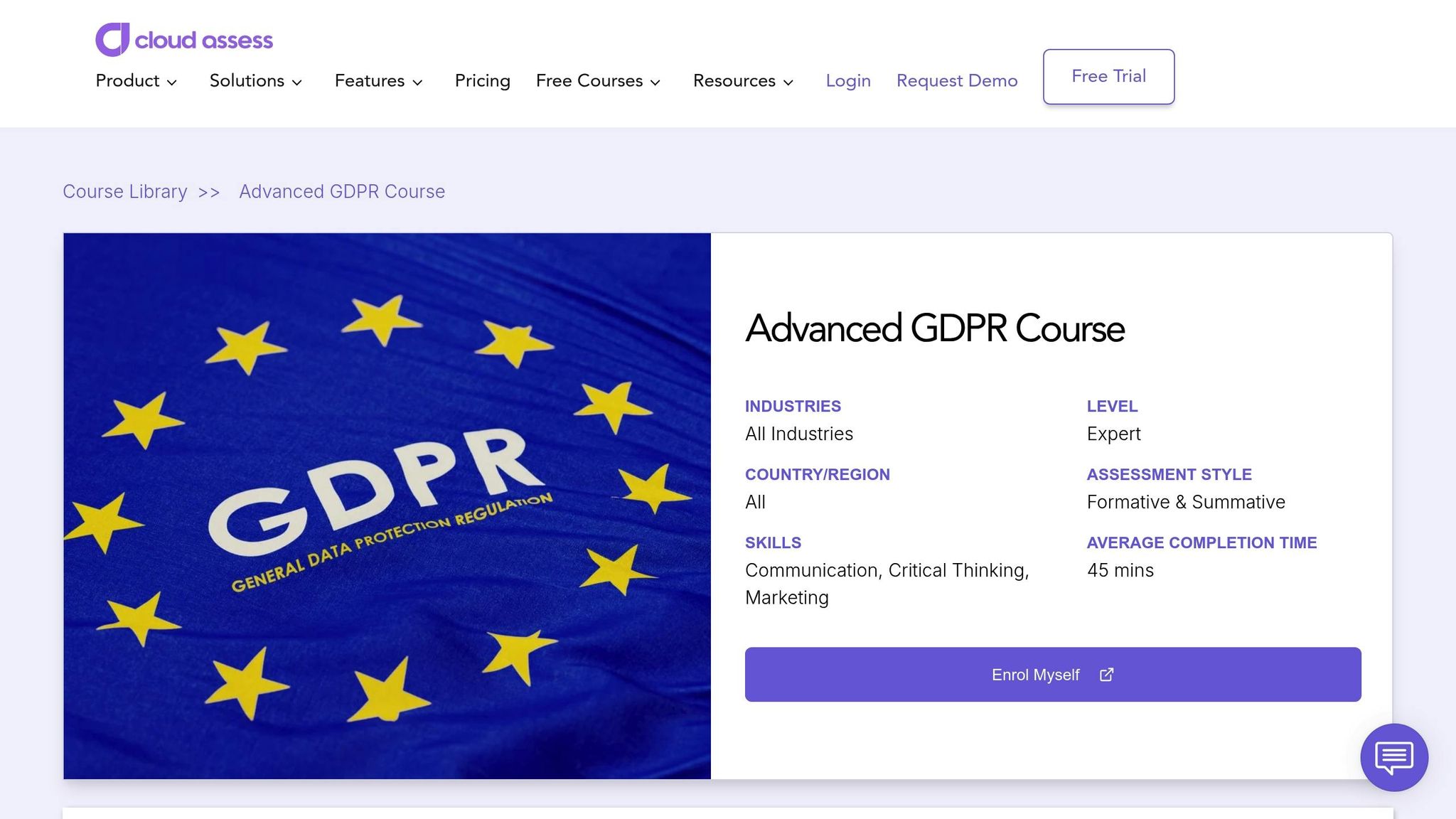
Cloud Assess provides an entry-level GDPR training program designed to equip participants with the basics of compliance. This course introduces the core principles of GDPR, explains key terminology, and walks through practical steps for managing the personal data of EU citizens. It’s an ideal starting point for anyone looking to build a strong understanding before diving into more advanced GDPR topics.
The course is offered free of charge to businesses of all sizes. It covers critical areas such as the roles of data controllers and processors, the concept of data protection by design and default, and the distinction between consent and legitimate interest - essential knowledge for companies involved in cross-border data exchanges.
Emphasis on Data Sharing and Third-Party Compliance
A key focus of the course is on lawful data sharing and ensuring compliance when working with third parties. It outlines the responsibilities businesses have when sharing data internally or with external partners, such as vendors or collaborators. Through real-world examples and hands-on exercises, the training demonstrates how GDPR principles can be applied in everyday business operations, especially for U.S. companies working with European partners.
Certification and Proof of Completion
Participants who complete the course receive a digital certificate. This certificate can be a valuable asset for audits, providing client assurance, and demonstrating compliance efforts to European partners.
Flexible Learning Options
The course is delivered through self-paced online modules, allowing employees to complete the training in just a few hours. Interactive assessments and exercises are included to help reinforce the material and ensure a thorough understanding of the key concepts.
2. Cloud Assess: Advanced GDPR Training Course
Cloud Assess offers an advanced GDPR training program tailored for seasoned compliance professionals. This course is specifically designed for roles such as data controllers, data processors, data entry staff, and data management teams. It dives deeper into GDPR complexities, focusing on the challenges of data sharing and maintaining compliance in intricate scenarios.
The curriculum builds on foundational GDPR concepts, covering essential topics like core principles, legal bases for data processing, rights of data subjects, and robust data security practices. It also includes strategies for responding to data breaches and managing cross-border data transfers - key considerations for U.S. businesses operating in global markets.
Focus on Data Sharing and Third-Party Compliance
One of the standout features of this course is its focus on cross-border data transfers and ensuring third-party compliance. Since navigating these areas is a significant hurdle for many U.S. companies, the course provides actionable strategies to integrate privacy into everyday business operations. This includes guidance on data sharing protocols, vendor management, and contractual safeguards.
The program also incorporates real-world case studies to highlight the risks of third-party compliance failures, demonstrating how such missteps can lead to regulatory penalties. Participants learn about drafting and managing data processing agreements and gain clarity on obligations when handling data with EU-based partners. This practical approach ensures that businesses are better equipped to handle international data-sharing scenarios.
Certification and Proof of Completion
To underline its thorough approach, the course includes a certification process. While specific details should be confirmed directly with Cloud Assess, most reputable GDPR training programs provide digital certificates or badges upon completion. These certifications typically include the training level, completion date (formatted as MM/DD/YYYY), and a summary of covered topics. This documentation can be useful for demonstrating compliance efforts to both regulators and clients.
Flexible Learning Options
The course is delivered online through self-paced modules, making it an excellent option for distributed teams. This flexibility allows U.S.-based organizations to train their staff without disrupting day-to-day operations. The program also includes strategies for breach preparedness and recovery, ensuring consistent knowledge across the organization.
3. Advisera: EU GDPR Foundations Course
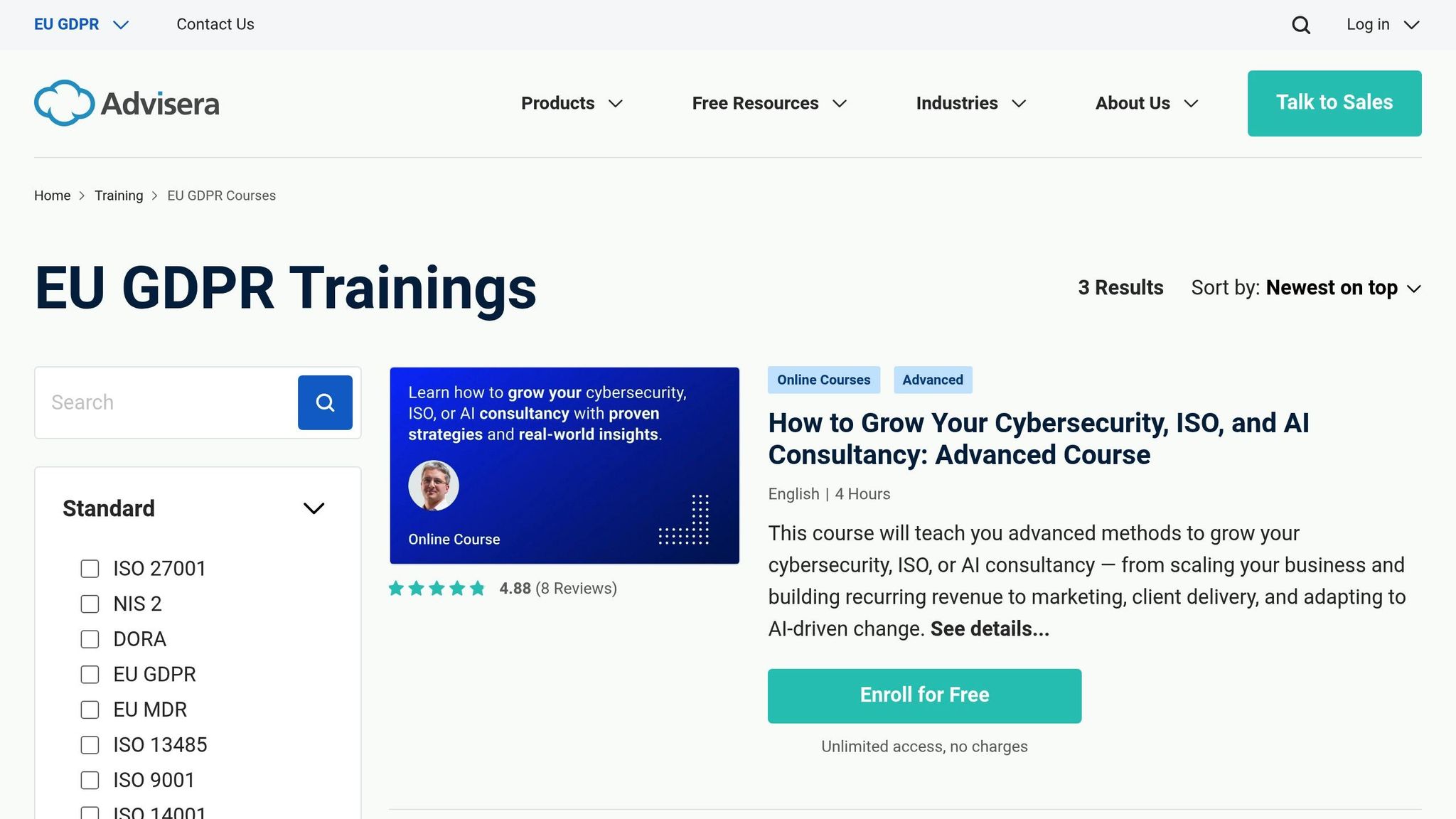
Advisera's EU GDPR Foundations Course is an introductory training program tailored to professionals at all levels, offering a solid understanding of GDPR compliance. It covers key areas like data subject rights, lawful data processing, and breach notification procedures, equipping organizations to manage personal data effectively.
The course breaks down complex legal concepts into simpler terms, making it easier for non-legal professionals to grasp the essentials. This straightforward approach highlights Advisera's role as a go-to resource in the field of data privacy education.
Advisera's reputation as a trusted name in compliance training is well-established, with its materials frequently cited by industry experts and certification authorities. This course, like other top-tier programs, focuses heavily on best practices for cross-border data sharing and third-party data processing - critical topics for U.S. companies working with EU partners. Participants learn about key responsibilities like drafting data processing agreements, ensuring vendor compliance, and monitoring associated risks. Practical exercises, such as creating data-sharing agreements, responding to breaches, and assessing vendor risks, help learners put GDPR principles into action. The course also delves into cross-border data transfer rules and emphasizes the importance of documenting data-sharing activities, a crucial practice for businesses collaborating across borders.
In addition to its practical focus, the course offers certification upon completion, verifying participants' foundational GDPR knowledge. This certificate can be a valuable asset during internal audits, regulatory checks, or client evaluations.
To make training accessible, Advisera offers this course online in a self-paced format, allowing employees to learn without disrupting their regular duties. This flexibility is particularly helpful for small and medium-sized businesses with remote or distributed teams. Pricing for the course typically ranges from $200 to $400, with options for self-paced learning, instructor-led sessions, or bundled packages that include certification exams.
4. TechGDPR: Privacy & GDPR Compliance Course for Developers
TechGDPR's Privacy & GDPR Compliance Course is designed to help developers and IT professionals seamlessly integrate GDPR principles into their products. It addresses the specific challenges of building systems that prioritize privacy and secure data sharing.
The course dives into essential topics like privacy by design, secure data processing, data minimization, encryption, and pseudonymization. It also offers practical advice for embedding privacy practices into DevOps workflows, managing third-party API data sharing, and staying aligned with regulatory requirements. These insights are critical for establishing secure and compliant data-sharing methods.
Spotlight on Data Sharing and Third-Party Compliance
A significant portion of the curriculum focuses on the roles of data controllers and processors, the essentials of data processing agreements, and best practices for managing third-party vendors. Participants learn actionable techniques to implement technical and organizational measures that ensure compliance in data-sharing scenarios.
The course uses real-world examples, such as navigating cross-border data transfers and responding to data subject requests, to help participants apply GDPR principles in various tech environments like SaaS, cloud services, and app development. A 2024 IT Governance survey revealed that over 60% of data breaches in tech companies stemmed from improper data sharing or the lack of privacy-by-design practices. This highlights the importance of the skills taught in the program.
Certification and Proof of Expertise
Participants who complete the course successfully earn a certification that confirms their expertise in GDPR compliance. This certification demonstrates their ability to align technical measures with GDPR requirements. For U.S.-based companies collaborating with EU partners, this certification is particularly valuable. It shows that technical teams are skilled in areas such as consent mechanisms, audit trails, and responding to data breaches.
Flexible Learning Options
TechGDPR offers multiple learning formats to accommodate global teams, including online, self-paced, and instructor-led sessions. For organizations dealing with specific challenges in data sharing or third-party compliance, the course also provides tailored workshops. These workshops are customized for companies managing EU data. Pricing depends on the format and team size, with instructor-led sessions ranging from $350 to $1,200 per participant, and group discounts available.
The demand for developer-focused GDPR training is on the rise. Sprinto reports that over 100 SaaS businesses have already utilized specialized GDPR training to meet compliance standards. This trend underscores the growing importance of equipping tech teams with the right tools and knowledge to navigate GDPR requirements effectively.
5. Coursera: The ABC's of GDPR Training Course

Coursera's "The ABC's of GDPR Training Course" offers a straightforward introduction to GDPR, tailored for U.S. businesses managing EU data. It breaks down complex rules into manageable concepts, setting the stage for more advanced compliance discussions.
The course dives into key topics such as data subject rights, lawful bases for processing, data breach notification requirements, and the responsibilities of data controllers and processors. These areas are crucial for shaping how businesses handle data-sharing agreements and navigate relationships with third parties under GDPR.
Focus on Data Sharing and Third-Party Compliance
A significant portion of the course tackles challenges around data sharing. Participants gain practical insights into managing vendor and partner relationships, with a focus on vetting third parties effectively.
Real-life examples are woven into the curriculum, illustrating common scenarios where data sharing can go wrong. These examples highlight potential compliance risks and offer actionable strategies for safeguarding data. By addressing real-world challenges, the course equips learners with tools to ensure GDPR compliance in their vendor relationships, aligning with the broader goal of effective cross-border data management.
For U.S. companies with global operations, the course also explains GDPR's extraterritorial scope. It clarifies how the regulation applies to any business processing the personal data of EU residents, regardless of its physical location. This is especially relevant for American companies serving European customers or tracking their behavior online.
Availability of Certification or Proof of Completion
Upon completing the course, participants earn a digital certificate that can be shared on LinkedIn or added to professional portfolios.
This certificate isn't just a resume booster - it’s a practical asset for compliance audits and training records. According to a 2024 industry survey, companies with structured GDPR training programs are 37% less likely to face compliance-related fines compared to those without formal training. This statistic highlights the importance of documented training for meeting regulatory requirements.
Flexibility in Learning Formats
Flexibility is a key feature of this course. It’s fully online and self-paced, allowing learners to start whenever it suits them.
With a completion timeline of 1 to 3 months and a weekly time commitment of just 2 to 4 hours, the course is accessible to busy professionals. Pricing ranges from free to $49, making it an affordable option for U.S. learners. The course is offered in U.S. English and provides certificates formatted to meet American employers' and compliance documentation needs.
sbb-itb-5f36581
6. IAPP Data Privacy Training
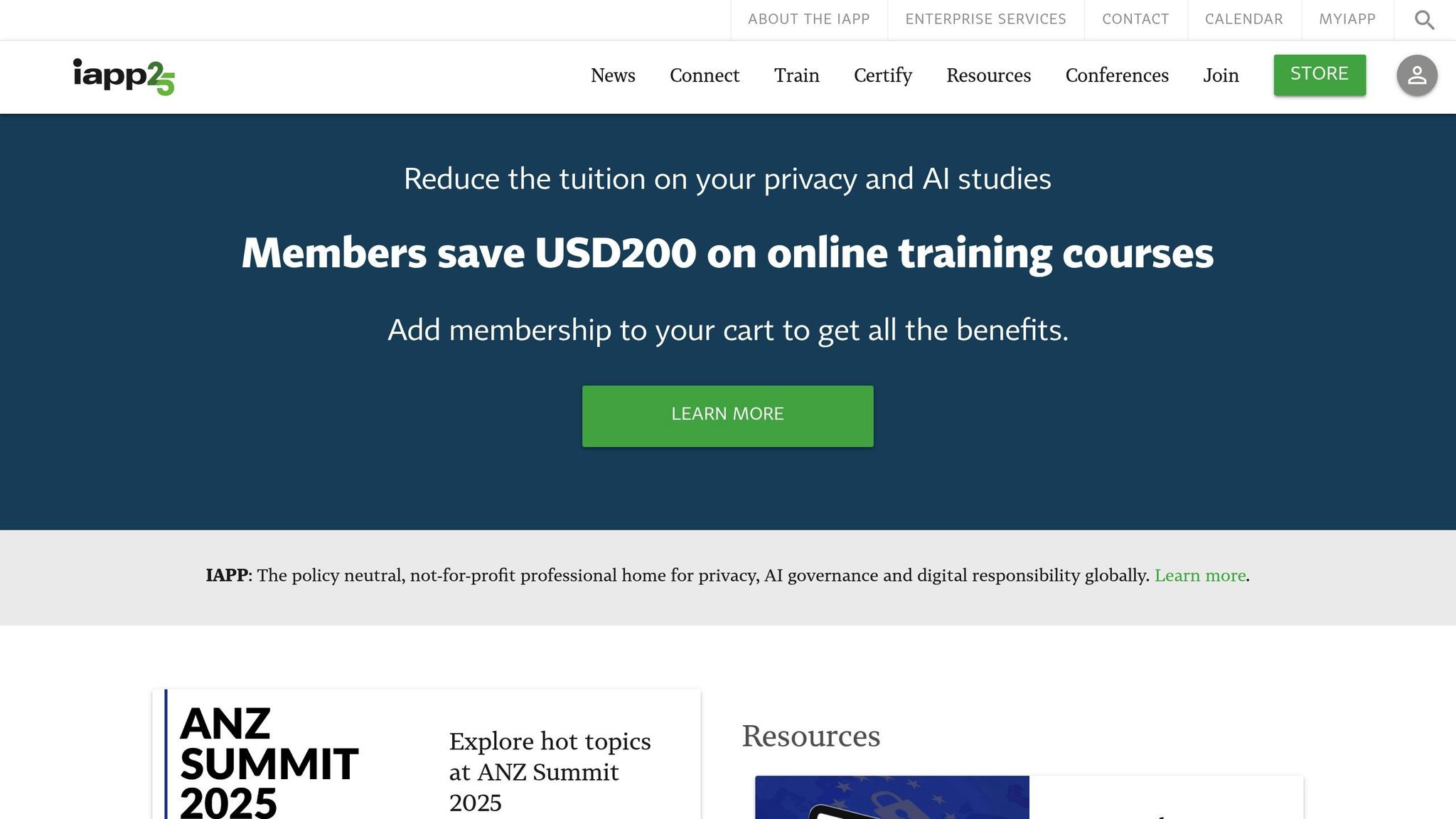
The IAPP (International Association of Privacy Professionals) stands out as a leading provider of GDPR training, offering programs that are crucial for ensuring compliance in data sharing. With a membership exceeding 70,000, IAPP is recognized as the largest privacy-focused organization worldwide. Its training courses are particularly beneficial for U.S. companies navigating GDPR requirements when sharing data with EU partners.
Accreditation and Recognition of the Training Provider
IAPP operates as a nonprofit dedicated to advancing the privacy profession. Its certifications - CIPP/E (Certified Information Privacy Professional/Europe), CIPM (Certified Information Privacy Manager), and CIPT (Certified Information Privacy Technologist) - are widely acknowledged as benchmarks of expertise in GDPR and data privacy. The CIPP/E certification, in particular, aligns with the knowledge standards required for Data Protection Officers (DPOs) under GDPR. A 2024 survey found that 82% of U.S.-based privacy professionals consider IAPP training indispensable for mastering GDPR compliance and best practices in data sharing.
Focus on Data Sharing and Third-Party Compliance
IAPP's training programs delve deeply into the complexities of GDPR-compliant data sharing. Certifications like CIPP/E and CIPM include specialized modules on lawful data transfers, cross-border sharing, and managing third-party risks - key areas for U.S. companies handling EU data. The curriculum also covers practical tools such as Standard Contractual Clauses and Binding Corporate Rules, offering step-by-step guidance on implementing these mechanisms. Additionally, participants learn how to build robust vendor management systems and conduct thorough due diligence for third-party processors.
Availability of Certification or Proof of Completion
After completing IAPP certification exams, participants receive digital certificates and verifiable credentials. These certifications are highly valued in the job market, particularly for roles centered on GDPR compliance or DPO responsibilities. Many job postings in privacy, compliance, and legal fields across the U.S. specifically mention IAPP credentials as either required or preferred qualifications, making them a strong asset for professionals aiming to advance their careers in data governance.
Flexibility in Learning Formats
IAPP provides a variety of training formats to accommodate the schedules of busy professionals. Options include live online courses led by instructors, self-paced e-learning modules, and in-person workshops held in major U.S. cities and at international conferences. The training content is tailored for U.S. audiences handling EU data, ensuring relevance and accessibility. Participants can choose the format that best suits their learning style, whether they prefer interactive sessions or independent study. As of October 2025, course fees range from $550 to $1,800, with additional costs for exams and membership. Discounts for group enrollments and members make the programs more accessible for organizations investing in team-wide compliance efforts. This flexibility makes IAPP a vital resource for professionals navigating GDPR compliance in an increasingly complex data landscape.
7. PECB GDPR Training and Certification
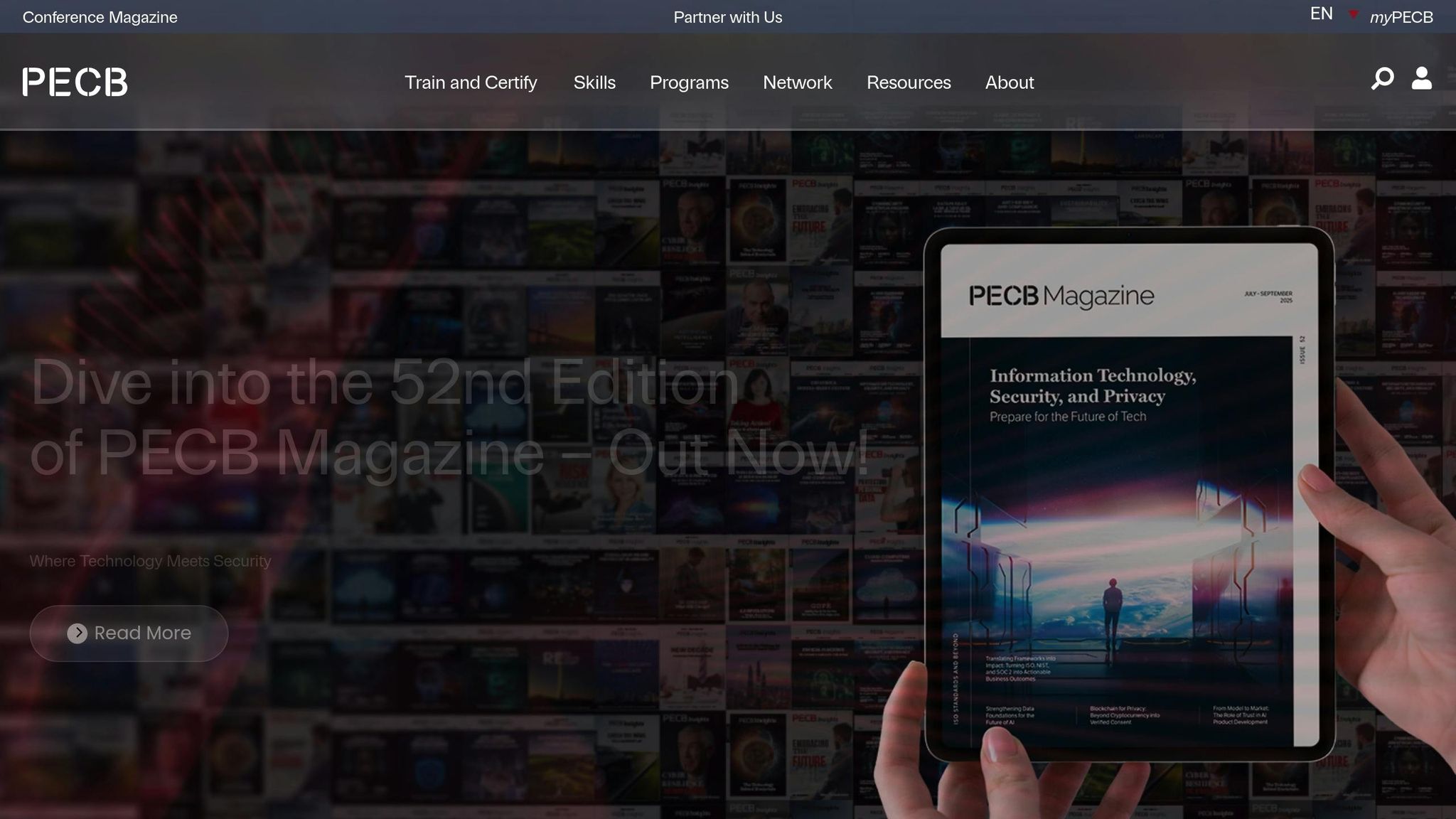
PECB (Professional Evaluation and Certification Board) offers some of the most respected GDPR training programs available today. Known for its globally recognized certifications, PECB provides structured learning paths, including the highly sought-after Certified Data Protection Officer (CDPO) course. This program is tailored for professionals tasked with managing data protection under EU regulations.
Accreditation and Recognition of the Training Provider
PECB holds dual accreditation from ANSI and IAS, both of which add substantial weight to its certifications. For U.S.-based companies working with EU partners or navigating regulatory requirements, this credibility is particularly valuable. Employers and regulatory bodies widely accept PECB certifications, making them a strong addition to the credentials of professionals specializing in data protection and privacy. This level of recognition underscores PECB's ability to prepare individuals for the intricate challenges of GDPR compliance.
Focus on Data Sharing and Third-Party Compliance
PECB’s training programs place a strong emphasis on the complexities of lawful data sharing and managing third-party processors. Participants explore practical aspects of compliance, including the creation and use of Data Processing Agreements (DPAs) and conducting thorough due diligence. Hands-on exercises simulate real-world scenarios like drafting DPAs, evaluating third-party risks, and managing data subject requests during cross-border transfers. This practical approach ensures participants gain actionable skills for navigating GDPR requirements.
Availability of Certification or Proof of Completion
After completing the course and passing the PECB exam, participants earn certifications such as "PECB Certified GDPR Foundation" or "PECB Certified Data Protection Officer." These certifications act as formal proof of expertise in GDPR compliance. Additionally, PECB provides digital badges, which professionals can display on platforms like LinkedIn to highlight their qualifications. In a job market where verifiable credentials are increasingly important, these digital badges add an extra layer of credibility for those managing data protection responsibilities.
Flexibility in Learning Formats
To accommodate different learning styles and schedules, PECB offers a variety of formats, including instructor-led classroom sessions, live online courses, and self-paced e-learning options. For example, the CDPO course is typically completed in three days, while foundational courses last two days, and advanced programs can take four to five days. Course fees range from $1,000 to $2,500, depending on the format and certification level. This range of options allows U.S.-based participants to choose a format that aligns with their needs and professional goals.
8. LinkedIn Learning: Achieving GDPR Compliance with Microsoft Technologies

The "Achieving GDPR Compliance with Microsoft Technologies" course on LinkedIn Learning is tailored for IT professionals who operate within the Microsoft ecosystem. Taught by Andrew Bettany, a seasoned expert in Microsoft technologies and data protection, this intermediate-level course bridges the gap between GDPR requirements and their practical application using Microsoft 365 and related cloud tools. It builds on earlier compliance-focused courses, offering deeper insights into aligning protocols for tech-driven teams.
Accreditation and Recognition of the Training Provider
LinkedIn Learning is a well-known platform offering expert-led courses across a wide range of subjects. While it doesn’t provide formal regulatory accreditation for GDPR compliance, its courses are highly valued for professional growth. Many organizations rely on LinkedIn Learning to enhance employee knowledge in areas like data protection and privacy. The involvement of instructors like Andrew Bettany adds substantial credibility to the course content.
Emphasis on Data Sharing and Third-Party Compliance
This course places a strong focus on secure data sharing practices, particularly when working with third-party vendors. It dives into configuring Microsoft 365 and other tools to ensure compliant data exchange. Key topics include protecting devices and data, separating sensitive information, preventing data leaks, and safeguarding shared data within the Microsoft ecosystem.
The course also features practical demonstrations, such as setting up Data Loss Prevention (DLP) policies, utilizing Microsoft Cloud App Security, and applying Azure Information Protection. These tools help learners apply GDPR principles in real-world scenarios, making it especially useful for businesses managing third-party relationships.
Certification and Flexible Learning Options
Learners who complete the course earn a LinkedIn Learning certificate, which can bolster their professional credentials. The course is self-paced and available through a subscription model, making it a convenient option for working professionals. Additionally, it introduces tools like the Compliance Manager dashboard in Microsoft 365, enabling users to perform regular compliance assessments, monitor remediation progress, and produce audit-ready reports. These features simplify the process of maintaining GDPR compliance over time.
9. Reform: No-Code Form Builder for GDPR-Compliant Data Sharing
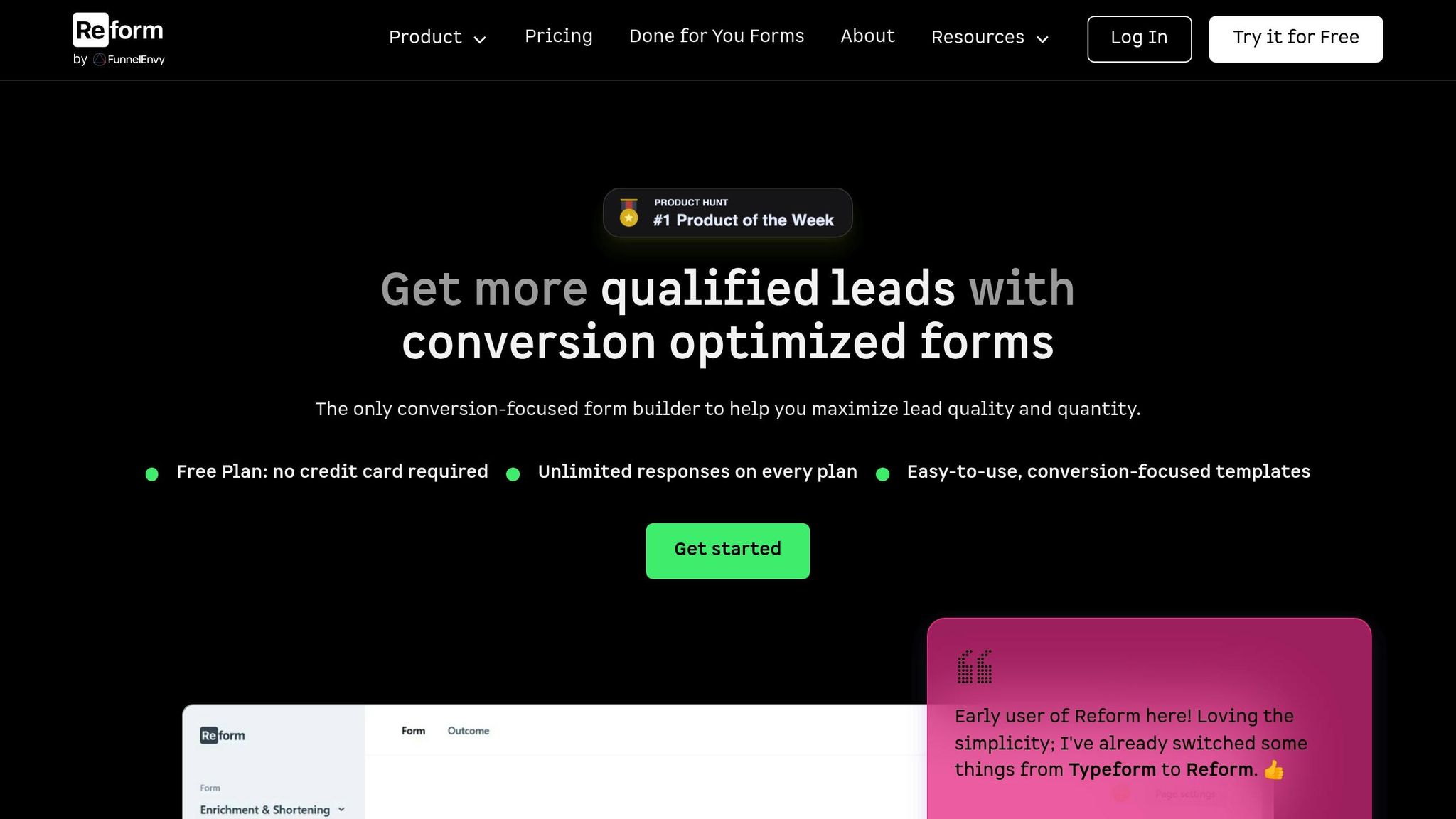
Reform goes beyond traditional GDPR training by providing a hands-on tool to ensure compliant data collection and sharing. While typical GDPR training focuses on certification, Reform equips businesses with a practical platform to handle data responsibly.
Reform's platform includes features like multi-step forms, conditional routing, lead enrichment, spam prevention, email validation, real-time analytics, and integrations with marketing and CRM tools. These capabilities ensure businesses collect only the data they need, while maintaining transparency and accountability throughout the process.
Focus on Data Sharing and Third-Party Compliance
Reform addresses GDPR data sharing requirements by enabling explicit consent, enforcing data minimization, and embedding clear privacy notices directly into forms. Its integration capabilities allow secure data transfers to approved third-party tools like CRM systems and marketing platforms.
For example, a SaaS company in the U.S. can create a multi-step signup form that includes a GDPR-compliant consent checkbox, a linked privacy policy, and conditional routing to ensure only essential data is collected.
The platform’s real-time analytics provide visibility into data collection processes, which is especially useful during audits. Additional technical features like audit logs, consent records, and customizable privacy statements help businesses demonstrate compliance, whether they’re undergoing an audit or responding to data subject requests.
Availability of Certification or Proof of Compliance
Unlike traditional training programs that offer formal certifications, Reform focuses on providing the tools and documentation businesses need to implement GDPR principles in their daily operations. Features like consent tracking and clear data collection records help organizations prove compliance when necessary.
Reform also ensures accessibility in its form designs, enabling all users, including those with disabilities, to exercise their data rights without obstacles. This practical, technical approach complements educational programs by making compliance easier to achieve in real-world scenarios.
Flexible, Self-Service Deployment
Reform is a no-code, online platform designed for flexibility, making it ideal for businesses across different time zones. Its no-code setup allows non-technical users to quickly create and deploy GDPR-compliant forms, cutting down on reliance on IT teams and speeding up compliance efforts. Companies using tools like Reform report form deployment times that are up to 40% faster compared to traditional development methods.
Reform offers two pricing tiers: the Basic Plan at $15/month and the Pro Plan at $35/month. The Pro Plan includes advanced features like team access, file uploads, and enhanced integrations.
Privacy experts recommend that businesses using no-code tools like Reform conduct Data Protection Impact Assessments (DPIAs) for new data processes, ensure all third-party integrations comply with GDPR, and maintain thorough documentation of data flows. Reform supports these best practices by providing the transparency, control, and auditability required by modern data protection laws. By combining technical tools with training insights, Reform bridges the gap between understanding GDPR and putting it into action.
Training Program Comparison Table
Choosing the right GDPR training program depends on your team’s specific needs, budget, and compliance goals. Below is a detailed comparison of various programs, outlining their target audience, core topics, delivery methods, certification options, duration, and cost.
| Provider | Target Audience | Main Topics Covered | Format | Certification | Duration | Cost (USD) |
|---|---|---|---|---|---|---|
| Cloud Assess (Intro) | All employees | GDPR basics, roles, principles, compliance | Online, self-paced | Certificate of completion | 1–2 hours | Free |
| Cloud Assess (Advanced) | Data controllers/processors | Advanced GDPR, data security, breach response | Online, self-paced | Certificate of completion | 2–4 hours | Free |
| Advisera | Business professionals | GDPR foundations, compliance, data subject rights | Online, self-paced | Yes | 4–8 hours | $200–$400 |
| TechGDPR | Developers, IT professionals | Privacy by design, technical compliance | Online, instructor-led | Yes | 1–2 days | $500–$1,000 |
| Coursera | General audience | GDPR fundamentals, compliance, practical application | Online, self-paced | Certificate of completion | 4–8 hours | $49–$99 |
| IAPP | Privacy professionals, legal, DPOs | Comprehensive GDPR, privacy management | Online/in-person | Industry-recognized (CIPP/E, CIPM) | 2–5 days | $1,000–$2,000+ |
| PECB | Compliance officers, managers | GDPR implementation, audit, certification | Online/in-person | Industry-recognized | 2–5 days | $1,000–$2,500 |
| LinkedIn Learning | IT professionals, Microsoft users | GDPR with Microsoft 365, compliance tools | Online, self-paced | Certificate of completion | 1–2 hours | $39.99/month |
| Reform | Business users, marketers, ops | GDPR-compliant data sharing, form building | Online platform | N/A | N/A | Custom pricing |
Key Insights
The variety of programs ensures there’s something for every organization, whether you’re looking for introductory knowledge or advanced certifications. For example, Cloud Assess offers free, self-paced courses that cover the basics, making them ideal for general staff training. On the other hand, IAPP and PECB deliver industry-recognized certifications, which are especially valuable for compliance officers and data protection professionals.
Cost and delivery format are critical factors to consider. Free and affordable options, like Coursera or LinkedIn Learning, provide flexibility with self-paced learning. Conversely, programs like TechGDPR and IAPP offer in-depth, instructor-led training, perfect for roles requiring technical expertise or leadership in compliance.
Certification plays a big role in determining the program’s value. For example, IAPP certifications are widely regarded as the “gold standard” in data privacy and are globally recognized by employers. Organizations aiming to demonstrate compliance to regulators or clients may find these certifications particularly useful.
The target audience column in the table serves as a quick reference to match programs with specific roles. For instance, foundational courses like Cloud Assess (Intro) are suitable for general staff, while advanced certifications from PECB or IAPP are tailored for compliance officers and privacy managers. Tools like Reform cater to operational needs, helping teams manage GDPR-compliant data sharing in their day-to-day workflows.
Over 100 SaaS companies have successfully leveraged these training programs to meet GDPR compliance requirements across multiple frameworks. Whether you’re training a large workforce or equipping specialists with advanced knowledge, there’s a program designed to fit your needs.
Conclusion
GDPR training programs have become a necessity for any business handling data from EU residents. With fines reaching as high as $21.5 million or 4% of annual global revenue, the financial risks alone highlight the importance of thorough training programs. But beyond avoiding penalties, these programs help build a culture of data protection, reducing the likelihood of breaches and earning customer trust.
The key to success lies in tailoring training to your organization's specific needs. For general staff, foundational courses - like the free introductory program from Cloud Assess - offer an excellent starting point. Meanwhile, data protection officers benefit from certifications provided by organizations such as IAPP or PECB. IT teams require technical modules that address privacy by design and breach response, while marketing and HR teams should focus on consent management and lawful data processing practices.
Fortunately, training options come in a range of price points, making them accessible to organizations of all sizes. Free resources, such as those from Cloud Assess, help establish a solid foundation. Subscription-based platforms like LinkedIn Learning provide ongoing access to updated materials, ensuring teams stay informed. For those seeking formal recognition, certifications like IAPP’s CIPP/E offer globally respected credentials and underscore a serious commitment to compliance.
To maximize effectiveness, consider combining traditional training with practical tools. Platforms like Reform go beyond education by integrating GDPR compliance into everyday workflows. Features like secure data collection and consent management ensure that compliance isn’t just theoretical - it becomes part of daily operations.
GDPR training isn’t a one-and-done effort. Regulations evolve, new threats arise, and employee turnover requires continuous education. Businesses that prioritize ongoing training see measurable improvements in compliance and risk management.
From basic courses to advanced certifications, every step strengthens your compliance framework. Whether you’re just getting started or advancing your expertise, the programs highlighted here offer clear paths to better data protection practices. The question isn’t whether you can afford GDPR training - it’s whether you can afford to ignore it.
FAQs
What’s the difference between beginner and advanced GDPR training programs, and how can I choose the right one for my team?
The key difference between beginner and advanced GDPR training programs is how deeply they explore the subject and what they focus on. Beginner programs lay out the essentials, such as the core principles of GDPR, individual rights, and general compliance requirements. These are great for teams who are new to GDPR or need a basic understanding of data protection laws.
Advanced programs, meanwhile, tackle more intricate topics like data impact assessments, international data transfers, and compliance strategies tailored to specific industries. These are ideal for teams with prior GDPR experience or those managing sensitive or large-scale data operations.
When deciding which level suits your team, think about their existing knowledge of GDPR and how complex your organization’s data-sharing practices are. If your team is starting from scratch, a beginner program can provide a solid foundation. For teams already familiar with GDPR or working in highly regulated fields, an advanced program might be the better fit.
How can GDPR certifications, like those from IAPP or PECB, help businesses improve compliance and strengthen partnerships with EU organizations?
GDPR certifications from organizations such as IAPP or PECB can play a key role in strengthening a company's approach to data protection. These certifications give employees the knowledge they need to navigate GDPR regulations and adopt best practices for handling sensitive information responsibly.
Beyond internal benefits, earning these certifications signals your company's dedication to data privacy. This commitment can enhance trust and credibility with EU partners, especially when working with clients or stakeholders who place a high value on strict GDPR compliance.
How can businesses apply GDPR principles in daily operations beyond completing training programs?
To weave GDPR principles seamlessly into everyday business practices, companies can take a few straightforward but impactful steps:
- Develop transparent data protection policies that clearly explain how personal information is collected, stored, and used.
- Limit data collection to only what’s absolutely necessary for the specific needs of the business.
- Make it simple for individuals to access their data and exercise their rights, like requesting updates or deletions.
On top of that, businesses should regularly carry out data protection impact assessments (DPIAs) to spot potential vulnerabilities and put robust security measures in place to avoid breaches. Incorporating these habits into daily operations not only helps ensure compliance but also strengthens customer confidence.
Related Blog Posts
Get new content delivered straight to your inbox

The Response
Updates on the Reform platform, insights on optimizing conversion rates, and tips to craft forms that convert.
Drive real results with form optimizations
Tested across hundreds of experiments, our strategies deliver a 215% lift in qualified leads for B2B and SaaS companies.


.webp)


